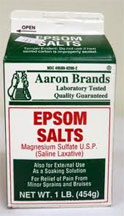Guess Who Needn't Worry About Magnesium Deficiency?
By Alice Osborne
Before answering the question, did you know that magnesium is the second most abundant element in human cells and the fourth most important positively charged ion in the body? It helps the body regulate over 325 enzymes and plays an important role in organizing many bodily functions, like muscle control, electrical impulses, energy production and the elimination of harmful toxins. (I learn all this stuff by reading Care2's Melissa Breyer.)
 Breyer says that our magnesium levels have dropped by half in the last century due to changes in agriculture and diet. Industrial farming has depleted magnesium from soil and the typical American diet contains much less magnesium than that of our forefathers. The sad thing is that the modern American diet - high in fat, sugar, salt and protein - actually speeds up the depletion of magnesium from our bodies.
Breyer says that our magnesium levels have dropped by half in the last century due to changes in agriculture and diet. Industrial farming has depleted magnesium from soil and the typical American diet contains much less magnesium than that of our forefathers. The sad thing is that the modern American diet - high in fat, sugar, salt and protein - actually speeds up the depletion of magnesium from our bodies.
And then there's our focus on getting enough calcium as one more reason magnesium levels have dropped. It's a delicate dance - calcium depletes magnesium yet calcium functions best when enough magnesium is present. Studies indicate that taking a calcium supplement without enough magnesium can increase the shortage of both nutrients. Researchers say that many Americans have five times as much calcium as magnesium in their bodies, although the proper ratio for optimum absorption of both minerals is two to one.
 So while many folks are deficient in magnesium, (here's the answer to the question in the title) VEGETARIANS fare pretty well. Vegetarians tend to naturally eat foods that are rich in this mineral - found in green vegetables, such as spinach, for instance. Greens are good sources of magnesium because the center of the chlorophyll molecule (which gives green vegetables their color) contains magnesium. Some beans (especially black beans), peas, nuts, seeds, and whole, unrefined grains are also good sources of magnesium. And again, vegetarians fill their diets with these things.
So while many folks are deficient in magnesium, (here's the answer to the question in the title) VEGETARIANS fare pretty well. Vegetarians tend to naturally eat foods that are rich in this mineral - found in green vegetables, such as spinach, for instance. Greens are good sources of magnesium because the center of the chlorophyll molecule (which gives green vegetables their color) contains magnesium. Some beans (especially black beans), peas, nuts, seeds, and whole, unrefined grains are also good sources of magnesium. And again, vegetarians fill their diets with these things.
The lack of this mineral is a big deal. According to the National Academy of Sciences, magnesium deficiency lends to high rates of heart disease, stroke, osteoporosis, arthritis and joint pain, digestive maladies, stress-related illnesses, chronic fatigue and a number of other ailments.
 Then what about supplements for the non-vegetarians, you ask? A reasonable question, but studies show that magnesium is not easily absorbed through the digestive tract. The presence of specific foods or drugs, certain medical conditions, and the chemistry of a person's stomach acid can render magnesium supplements ineffective. OK, that takes us back to incorporating more magnesium-rich food into the diet - the natural approach, which is always better anyway.
Then what about supplements for the non-vegetarians, you ask? A reasonable question, but studies show that magnesium is not easily absorbed through the digestive tract. The presence of specific foods or drugs, certain medical conditions, and the chemistry of a person's stomach acid can render magnesium supplements ineffective. OK, that takes us back to incorporating more magnesium-rich food into the diet - the natural approach, which is always better anyway.
But whether you're vegetarian or not, there is another potential magnesium source, and that's tap water (depending on how "hard" your water is). "Hard" water contains more magnesium. So if you use a water softener, be sure it's not hooked to your drinking supply - drinking hard water is a good thing.
 Finally (and this is just cool), here's another way to boost the magnesium levels in our blood and tissues: soak in a bath with Epsom salt, which is high in magnesium. I've been doing this for years. I have a beautiful tall glass canister I found at the thrift store that I keep on my bathroom counter full of Epsom salt.
Finally (and this is just cool), here's another way to boost the magnesium levels in our blood and tissues: soak in a bath with Epsom salt, which is high in magnesium. I've been doing this for years. I have a beautiful tall glass canister I found at the thrift store that I keep on my bathroom counter full of Epsom salt.
 Epsom salt is rich in both magnesium and sulfate. While both magnesium and sulfate can be poorly absorbed through the stomach, the skin (the largest organ in the body) absorbs it well, so magnesium-enriched baths are not just soothing, they're health-promoting! Sulfates play an important role in the formation of brain tissue, joint proteins and the proteins that line the walls of the digestive tract. They stimulate the pancreas to generate digestive enzymes and are thought to help detoxify the body of medicines and environmental contaminants.
Epsom salt is rich in both magnesium and sulfate. While both magnesium and sulfate can be poorly absorbed through the stomach, the skin (the largest organ in the body) absorbs it well, so magnesium-enriched baths are not just soothing, they're health-promoting! Sulfates play an important role in the formation of brain tissue, joint proteins and the proteins that line the walls of the digestive tract. They stimulate the pancreas to generate digestive enzymes and are thought to help detoxify the body of medicines and environmental contaminants.
 The Epsom Salt Industry Council website shares information (supported by physicians and scientists) that presents a strong platform for Epsom Salt bathing:
The Epsom Salt Industry Council website shares information (supported by physicians and scientists) that presents a strong platform for Epsom Salt bathing:
• Improved heart and circulatory health, reducing irregular heartbeats, preventing hardening of the arteries, reducing blood clots and lowering blood pressure.
• Improved ability for the body to use insulin, reducing the incidence or severity of diabetes.
• Flushed toxins and heavy metals from the cells, easing muscle pain and helping the body to eliminate harmful substances.
• Improved nerve function by electrolyte regulation. Also, calcium is the main conductor for electrical current in the body, and magnesium is necessary to maintain proper calcium levels in the blood.
• Relieved stress. Excess adrenaline and stress are believed to drain magnesium, a natural stress reliever, from the body. Magnesium is necessary for the body to bind adequate amounts of serotonin, a mood-elevating chemical within the brain that creates a feeling of well being and relaxation.
• Reduced inflammation to relieve pain and muscle cramps.
• Improved oxygen use.
• Improved absorption of nutrients.
• Improved formation of joint proteins, brain tissue and mucin proteins.
• Prevention or easing of migraine headaches.
 There are lots of Epsom Salt brands, but they are all the same product chemically, and can be found at most drug stores. You'll want to check with your doctor if you're expecting or have any health concerns first, but generally, just add two cups of Epsom salt and soak for at least 12 minutes. Enjoy this routine at least three times weekly. What a delightful way to take better care of our health!
There are lots of Epsom Salt brands, but they are all the same product chemically, and can be found at most drug stores. You'll want to check with your doctor if you're expecting or have any health concerns first, but generally, just add two cups of Epsom salt and soak for at least 12 minutes. Enjoy this routine at least three times weekly. What a delightful way to take better care of our health!

